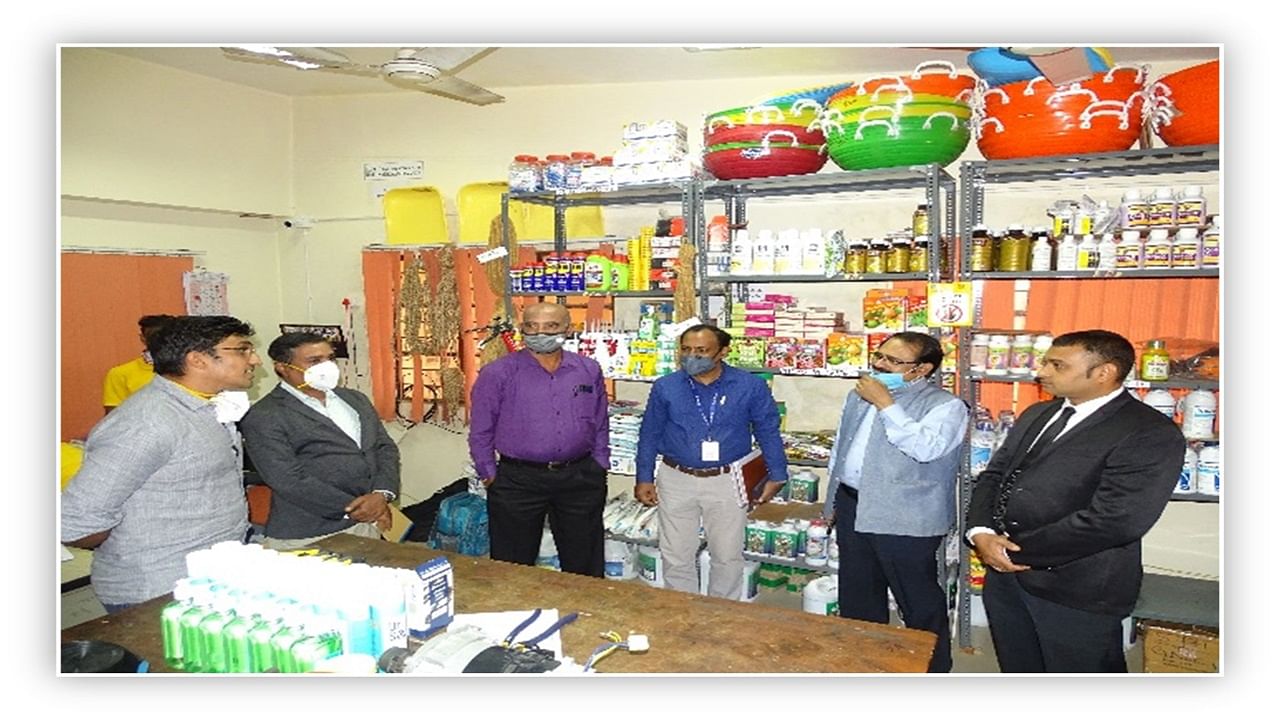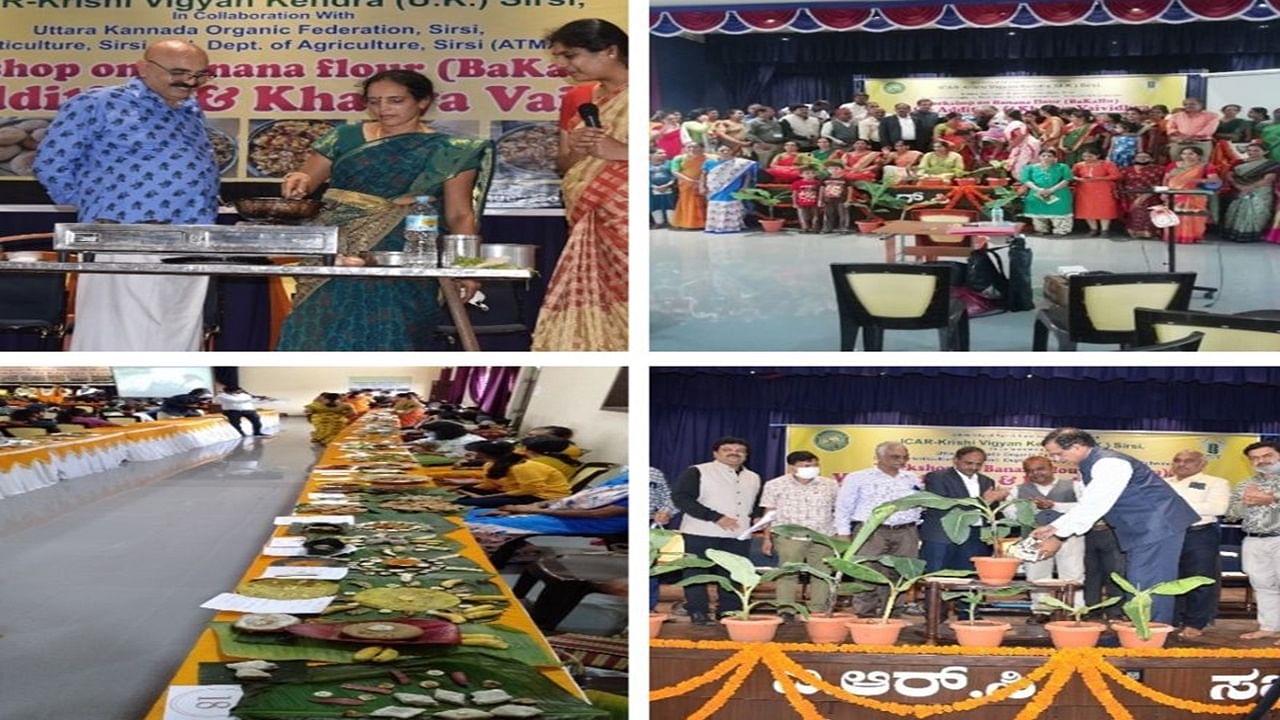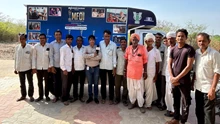
These KVKs are hosted by ICAR institutes, State Agricultural Universities (SAUs), State Government Departments and Non-Governmental Organizations (NGOs) with the financial support of the Government of India.
The Agricultural Extension Division headed by the Deputy Director General (Agricultural Extension) monitors and reviews the KVKs through eleven ICAR-Agricultural Technology Application Research Institutes (ATARIs) established in the country. The ICAR-ATARIs are the front-runners in technology assessment, technology demonstration, and capacity development of the farming community through a well-established network of KVKs.
The mandates of ICAR-ATARIs are (a) coordination and monitoring of technology application and frontline extension education programmes, and (b) strengthening agricultural extension research and knowledge management. Commensurate with these mandates, the following functional roles are set forth (i) establishment of KVKs, (ii) staffing, infrastructure, budgeting, and funding for KVKs, (iii) technical programme of KVKs for technological interventions and frontline extension programmes, (iv) technology backstopping and human resource development for KVKs, (v) coordination and monitoring of activities of KVKs, (vi) strengthening convergence and linkages, (vii) documentation of information/data for knowledge management, (viii) strengthening of agricultural extension research through need-based projects, (viii) coordination and implementation of ICAR projects and (ix) any other works assigned by the Agricultural Extension Division of ICAR.
The ICAR-ATARI, Zone-XI located at Hebbal, Bengaluru, Karnataka is one among them and has 48 KVKs under its operational jurisdiction of which 33 are in Karnataka, 14 in Kerala, and one in Lakshadweep these KVKs are under the administrative control of different host organizations viz., SAUs (33 KVKs), NGOs (8 KVKs) and ICAR Institutes (7 KVKs).
The mandate of KVK is technology assessment and demonstration for its application and capacity development. For fulfilling the prescribed mandate, the specific activities delineated are (a) On-farm Trials/ Testing (OFT) to identify the location specificity of agricultural technologies under various farming systems, (b) Front Line Demonstrations (FLDs) to establish production potential of technologies on the farmers' fields, (c) capacity development of farmers and extension personnel to update their knowledge and skills on frontier areas of agricultural technologies, (d) to work as knowledge and resource centre of agricultural technologies for supporting initiatives of public, private and voluntary sector for improving the agricultural economy of the district, (e) provide farm advisories using information communication technology (ICT) and other media on varied subjects of interest of farmers, (f) to take up production and supply of quality technological inputs/products (seed, planting material, bio-agents, livestock, poultry and fisheries ) through revolving fund and make them available to farmers at district level, and (g) organizing frontline extension activities, (h) identifying and documenting selected farm innovations, (i) Implementing special programmes/schemes of ICAR/DA & FW, Government of India and (i) converge with ongoing schemes and programs of various line departments in their respective districts within the mandate of KVK.
Thrust Areas
Based on the agro-ecological situation and prevailing cropping and farming systems, KVKs are broadly working on the following thrust areas:
- Introduction and up-scaling of improved varieties/ hybrids of crops and livestock breeds through technical and quality input backup.
- Sustainable crop production through integrated nutrient management and organic farming strategies.
- Integrated pest and disease management.
- Development and promotion of crop diversification and alternate land use systems.
- Empowerment of women and youth in terms of improved nutrition, income generation, and drudgery reduction through technology intervention.
- Scientific management of large ruminants, small ruminants and poultry.
- Promotion of horticulture as a mechanism of crop diversification and augmenting family income.
- Value addition, processing, and market facilitation of household and commercial enterprises.
- Soil health management, soil and water conservation for drought-proofing, and sustainable rainfed farming.
- Small-scale mechanization for saving time, reducing cost, and drudgery reduction.
- Capacity building of rural youth and women to establish self-employment units.
- Human resource development in the fishery sector through training and capacity building.
ICAR Special Programmes
The following are special programmes/schemes carried out by ATARI through its network of KVKs in Zone XI:
- Cluster Frontline Demonstrations on pulses under NFSM
- Cluster Frontline Demonstrations on oilseeds under NFSM (NMOOP)
- Seed hubs on pulses
- National Innovations in Climate Resilient Agriculture (NICRA)
- Skill Development Programme (ASCI)
- Attracting and Retaining Youth in Agriculture (ARYA)
- Swachhta Abhiyan
- District Ago Meteorological Units (DAMU) under KVKs
- Farmers FIRST
ICAR-ATARI Achievements
The ICAR-ATARI is playing a vital role in orienting the KVKs to function as knowledge and resource centres at district level for serving the farmers, farm women, rural youth, extension functionaries and other stakeholders through selected need-based appropriate agricultural technologies. The ICAR-ATARI is guiding its KVKs in terms of technology and methodology backstopping for the implementation of mandated activities through the formulation of various technical programs. Further, the ICAR-ATARI is structuring the technical programmes of KVKs through SAUs level and state-level annual action plan workshops in association with the Directorate of Extension Education of State Agricultural Universities before the start of Kharif season every year wherein technical programmes for each KVK are discussed and finalized. Accordingly, KVKs are implementing the action plan under the technical guidance of ICAR-ATARI, respective Director of Extension and host organizations wherein many technological interventions are being carried out.
The achievements of ICAR-ATARI and its 48 KVKs are compiled every year in the form of publication i.e. Annual Report with good illustrations, data and photos and is widely circulated among stakeholders. Further, a soft copy in the form of a PDF is also available on the Institute’s website for download (https://ataribengaluru.icar.gov.in). Some of the significant milestone activities carried out by the ICAR-ATARI through its KVKs are given below:
ICAR Spectrum of Successful Interventions
Puthari FPO Promoted by KVK, Kodagu: The Puthari Farmer Producer Organization was established and registered as Puthari Farmers Producer Company Ltd. in the year 2017 with financial support from NABARD under the technical guidance of KVK Kodagu and consists at present 980 members. Besides providing office space on its campus, KVK has provided handholding support to Puthari FPO through regular capacity-building programmes.
- The Puthari FPO deals with 430 products including manures, fertilizers, plant protection chemicals, irrigation pumps, sprinkler and drip irrigation items, farm machinery etc, catering to the needs of coffee, pepper and paddy farmers. Puthari FPO has also prepared a roadmap for the marketing of coffee and pepper grown by its members under its own brand “Jamma”.
- As dolomite and lime are used in bulk for plantation crops, Puthari FPO initiated a supply of certified lime and dolomite at the farmer's doorstep which saved about Rs. 1750/acre.
- The farm inputs supplied to farmers by Puthari FPO are at a much cheaper rate than in the market, as Puthari FPO charges only minimal administrative costs and keeps a minimum margin.
- This FPO is one of the largest farmer organizations in the area of plantation crops as it effectively translates into more than 25000 acres.
- Together, the members of Puthari FPO produced about 7500 tonnes of Robusta Coffee Cherry in one year. The company has achieved a turnover of Rs. 2.20 crores annually.
- The number of footfalls to KVK has increased to 60-80 farmers every day as the FPO outlet was placed on the KVK campus.
On Farm Sale of Watermelon Facilitated by KVK Udupi during COVID-19: Watermelon is cultivated on 350 acres in paddy fallows during late rabi and early summer in Byndoor taluk and Kundapura taluk of Udupi district. The major market for the watermelon cultivated in the Udupi district is Kerala and neighbouring districts-Dakshina Kannada and Uttara Kannada. lockdown period.
- Suresh Nayak, Hiryadka village, Udupi district has cultivated 13 acres of watermelon in the staggered system under the technical guidance of KVK, Udupi. Nayak has adopted recent technologies in watermelon cultivation. Unfortunately, all the trading links with the middlemen and wholesale traders from Kerala and other neighbouring states were closed because of the lockdown imposed on 23 March 2020 throughout the country due to the outbreak of the COVID-19 pandemic disease and he lost all his hopes of marketing which undergo huge loss, where he had spent nearly Rs 60,000 per acre as cost of production.
- In these circumstances, KVK came to the rescue and shared the information to nearly 3850 members of wholesale traders and individual buyers about the farmer details and quantity of watermelon harvested by Nayak through WhatsApp groups to all KVK contacts.
- Nayak sold nearly 36 tonnes in 3 days, at his farm at an average price of Rs 10/kg of fruit and sold more than 322 MT of watermelon, pumpkin, cucumber, pineapple, tapioca, onion etc. through on-farm sales with return of Rs. 22,80,500 during lockdown period.
Organic Grape Production with Two-Tier System of Fruit Bearing by Ningond Dundappa Toravi under the technical guidance of KVK, Vijayapura-I: Vijayapura district is known for growing superior quality grapes for marketing not just in the state but also in the international market. Over 13400 ha of grape plantation exist across the district, whereas no other districts in the state have such a large grape plantation and the district is popularly known for its unique taste and deliciousness. Every year grapes are exported to Middle-East, European, and Australian countries. However, the grapes are facing many problems and the yield is reducing by 35 to 40 percent due to disease and pests. KVK Vijayapura-I has taken up awareness programmes on health and environmental problems due to the heavy use of chemicals by the grape farming community cultivators in the district.
- Ningond Dundappa Toravi from Madabavi village in Vijayapura taluk two-tier system method of grape cultivation under the technical guidance of KVK.
- He recorded yield levels to the tune of 40 to 50 percent more than that of the single fruit-bearing method. This method of grape cultivation influenced neighboring farmers and villagers and 30 farmers adopted it and experienced positive results.
- Organic fresh fruit and raisins produced by the farmer are in high demand by customers and fetch higher prices compared to market price. According to Ningond Dundappa Toravi, organically grown grapes are free from pesticide chemical residues.
Braving the COVID-19 crisis, farm women of Ballari script an inspiring success story in fig value addition (KVK, Ballari): Fig is an important horticulture crop grown in Ballari district in Karnataka. 'Ballari Red', a locally grown fig variety, is one among the few varieties grown throughout the year in India. It has excellent quality, sweetness, and colour. The variety covers 1100 hectares of farmland in the district. Chennai and Bengaluru are two major markets for Ballari Red. The COVID-19 lockdown in 2020 led to a break in the supply chain of raw figs and a sudden drop in demand. As these fruits have a very short shelf life, they were left unharvested on the fields as the small farmers considered it as a burden to incur additional labor costs for picking fruits.
KVK, Ballari responded quickly to this unprecedented situation on a war footing. KVK refined a post-harvest technology for producing fig bars and fig rolls, developed originally by UAS Raichur, to suit local needs. This was disseminated to farm women of Srinivas camp, Kurugodu taluk in Ballari district where figs are grown extensively. Hands-on training, online advisories, field visits, and demonstrations organized by KVK Ballari for the farm women, led to impactful results. Self Help Group (SHG) leaders Mrs. Sudha and Mrs. Pooja learned the process of making value-added products. FSSAI licenses were obtained, and branding and labeling were done.
With the market intelligence gained, the group is now planning to produce 15-20 quintals of fig rolls each day by employing 60 skilled women.
KVK-Ballari helped to establish links between the entrepreneurs and local administration. This helped to install Solar Tunnel Dryers by the Dept. of Horticulture. Under the Prime Minister's Formalisation of Micro Enterprises (PM FME) 'One District-One Product' (ODOP) scheme, fig is identified as a potential crop for the Ballari district. KVK-Ballari arranged a platform for the interaction of the farm women entrepreneurs with the expert advisors of the PM FME scheme. Thus a small but firm step in fig value addition is evolving into a long successful journey with the able handholding of ICAR-KVK, Ballari.


Banana flour finding place in Indian Food Recipe by KVK, Uttara Kannada: Indian stakeholders are now taking food items prepared with banana flour. Realising the immense potential and opportunities available with banana flour, a workshop on “Banana flour (BaKaHu) value addition and Competition” was organized by ICAR-Krishi Vigyan Kendra, Uttara Kannada, Sirsi in collaboration with Uttara Kannada Organic Federation, Sirsi, Dept. of Horticulture, Sirsi and State Dept. of Agriculture (ATMA) on 11.08.2021 at KVK Uttar Kannada (Sirsi), Karnataka as a part of the “Bharat Ka Amrut Mahotsav” to commemorate 75 Years of India’s Independence. Over 350 participants including Farmers, farm women, entrepreneurs, SHG, and other stakeholders participated in the banana workshop from various districts of Karnataka and fifteen persons from different parts of the country, connected through an online platform. This event fuelled interest among women across Karnataka and the country to use banana flour with traditional food items.
- The food, nutrition, and energy value of banana flour is widely popularised by women groups with high commercial importance and prosperity among the farmers.
- The main attraction of the Workshop was the Exhibition cum competition of BaKaHu value-added products. Nearly 56 farm women and SHG members participated and have prepared and exhibited more than 175 BaKaHu products in sweet, spicy and daily usable categories.
- The exhibition highlighted the importance of banana powder products' diversity and nutritional importance. Products were evaluated as excellent, very good and good categories; accordingly, certificates were issued to all the participants. Products such as Bakahu Chocolate, Bakahu Jalebi, Bakahu Cake, Bakahu Sanjivini, Bakahu Kurkure, Bakahu Bhakarwada, Bakahu Khakhra, Bakahu Uppittu, Bakahu Burfi, Bakahu Kare, Bakahu Chakli, Bakahu Idli, Bakahu Mudde etc. were rated as an excellent product.
- The integration of banana flour in day-to-day food items is silently spreading across the country even away from places like Mizoram from Karnataka.
Onattukara Spices Farmer Producer Company Promoted by KVK-Alappuzha: Alappuzha district in Kerala, once known for its quality turmeric production, went down during the past decades facing a lot of constraints. ICAR- KVK, Alappuzha, through a series of interventions including OFTs and FLDs, revived the sector, finally leading to the formation and promotion of a Farmer producer Organization (FPO), ‘Onattukara Spices Farmer Producer Company’ (OSFPC). The company registered in 2016 and focussed on quality seed availability, scientific cultivation, procurement, processing, and marketing activities of the major spice crops of the region viz., turmeric, ginger, pepper, and garcinia in close technical guidance of KVK. Prathibha, MLA of Kayamkulam inaugurated the Rural Mart and Farmer Facilitation Centre on 02 February 2021 and lauded the efforts of the KVK in handholding the farmers and upbringing a sector. The FPO procures 20-25 tons of turmeric annually from 264 shareholders of the Bharanikkavu and Mavelikkara blocks and sells at a better price than the prevailing market price.
Jojo Jacob’s horticultural nursery blooms into an array of innovative enterprises by KVK, Kozhikode: Jojo Jacob, aged 50 and ex-trainee of KVK, Kozhikode is a resident of Changaroth Panchayat of Kozhikode District in Kerala has established plant nursery unit in his farm. Mr. Jojo - Bindu couple worked over 16-18 hours a day which made their nursery famous even in faraway places of Kozhikode.
The focal point of the nursery is much-prized bush pepper plants from six months of age to 15 years. Probably their nursery must be the largest bush pepper nursery in the world selling over 18,000 plants annually.
Annual income from a mere 36 cents of land from nursery units is nearly Rs 25 lakh. Mr. Jojo has received several panchayat and district-level awards for his achievements.
To promote farming in a greater perspective, Smt. Bindu started a YouTube channel during the year 2019 named “Techflora” with over 80,000 subscribers.
Regular videos on farming for the benefit of farmers as well as young entrepreneurs are uploaded to the channel. She also conducts hands-on training for school and college students in both on and off-campus modes.
Drones to Re-define Farmer Drudgery Mitigation: Facilitated to farmers by ICAR-KVK, Thiruvananthapuram: Un-manned Aerial Vehicles (Drones) are now used in the agricultural sector for helping farmers to take up many agricultural operations like spraying pesticides, and fertilizers, micro-nutrients etc. to the crop and also to capture real-time crop parameters using sensors. The main advantages of such an advanced system are the reduction in labour and drudgery of application in vast areas and the precision of application with respect to the location and reachability of spray fluid on the crop canopy. The recurring cost of the project is very low, which aims to help farmers and increase yields.
ICAR- Krishi Vigyan Kendra, Mitraniketan, Thiruvananthapuram, facilitated farmers in this regard through Front Line Demonstration of drone-based spraying of micro-nutrients on paddy was taken up in coordination with the State Department of Agriculture and Farmers’ Welfare. Demonstration was conducted in the summer crop of paddy at Valiyachira Padasekharam of Chirayinkeezhu Taluk, Thiruvananthapuram, covering an area of 20 ha. The demonstration was inaugurated by the honourable Deputy Speaker Sri. V. Sasi, Kerala Legislative Assembly on 7 January 2021.



KAU Sampoorna, the micro-nutrient mixture for paddy developed by Kerala Agricultural University was sprayed in the field using a drone. Application of this micro-nutrient directly on the leaves reduced the diseases and increased the yield by 13.71 per cent.











